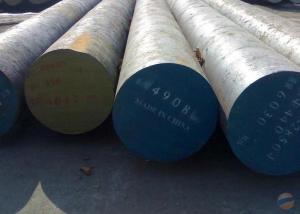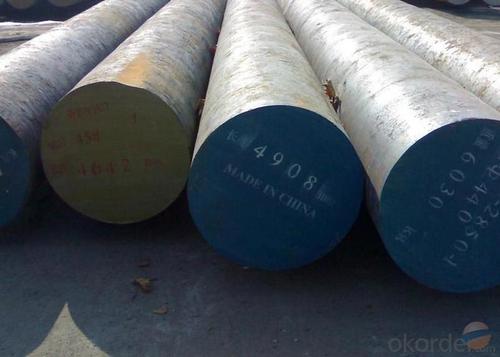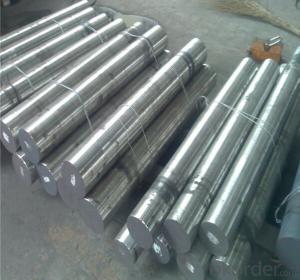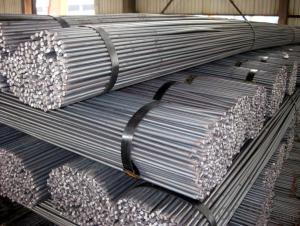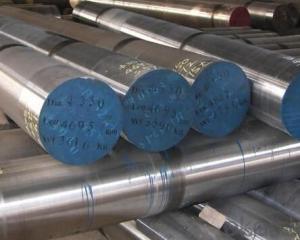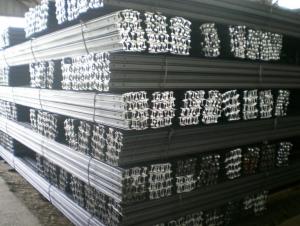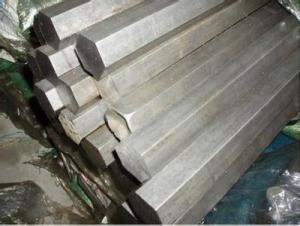Bearing Steel Bar
- Loading Port:
- China Main Port
- Payment Terms:
- TT or LC
- Min Order Qty:
- 25MT m.t.
- Supply Capability:
- 600000TONS/YEAR m.t./month
OKorder Service Pledge
OKorder Financial Service
You Might Also Like
Specifications of Bearing Steel Bar
1. Dimensional sizes: Thickness: 14~100mm.Length:3000~5800mm,Diameter :14-500mm
2.Chemical composition: C=0.96~1.05,Si=0.15~0.35,Mn=0.25~0.45,Cr=1.4~1.65,P≤0.025,S≤0.025,Ni≤0.22,Cu≤0.20,Mo≤0.08
3. Grade: SAE51200/ GCr15 / 100cr6
4. Heat Treatment:
Soft annealing: heat to 680-720°C, cool slowly.
Hardness after annealing: Max. 241 HB
Hardening: 820 - 850 °C
Normalizing temperature: 840-880°C
Tempering: 540-680°C
5. Surface requirements: Black, grinding, bright, polish
6. Payment terms: 20% deposit, balance against L/C at sight or T/T.
Usage & Applications of Bearing Steel Bar
Stable elements, low harmful elements, high-purity steel, evenly carbides, ewer surface defects;
using with wide range of plastic processing, heat treatment with stable quality, high and
evenly hardness, good wear resistance, high strength of contact fatigue; excellent cutting and process ability.
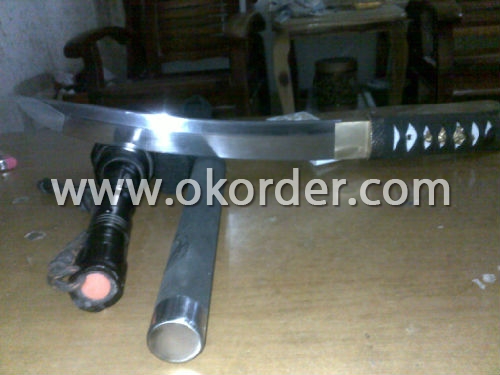
Packaging & Delivery of Bearing Steel Bar
Mark: Heat No. will be cold stamped and Steel grade, diameter (mm), length (mm), and the manufacturer LOGO and weight (kg) is painted.
Standard seaworthy packing or as customer required
Delivery time: Within 30 days after order is confirmed.
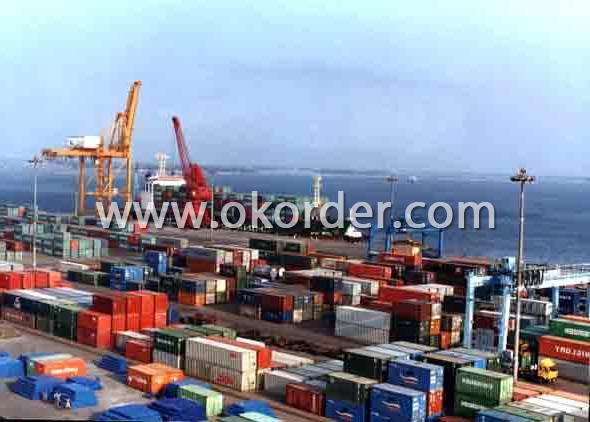
Note:
1. According to national standard (GB) for our products, if not, supply according to national standards (GB) or agreement.
2. We can not only provide electric furnace +LF+VD and electro-slag re-melting (ESR)steel forging materials, but also forging products of piece, bar, etc.
3. Our company is equipped with roll equipment and can provide our customers with roll billets or finished.
4. Please send us your detailed specifications when inquire. We will reply to you ASAP.
- Q: How is heat-resistant steel used in the production of furnaces and boilers?
- Heat-resistant steel is used in the production of furnaces and boilers due to its ability to withstand high temperatures. It is utilized in various components such as heat exchangers, tubes, and piping systems, ensuring efficient heat transfer and preventing structural damage. This steel's resistance to oxidation and corrosion guarantees longevity and reliability, making it an essential material for manufacturing furnaces and boilers.
- Q: Can special steel be used in the battery manufacturing industry?
- Yes, special steel can be used in the battery manufacturing industry. Special steel alloys with specific properties, such as high corrosion resistance, high strength, and good conductivity, are often utilized in battery manufacturing. These alloys are utilized in various components of the battery, including terminals, contacts, and current collectors, to enhance the overall performance and efficiency of the battery.
- Q: How does wear-resistant steel protect against abrasive wear?
- Wear-resistant steel protects against abrasive wear by having a higher hardness and toughness compared to the material it is protecting. This allows it to withstand the impact and friction caused by abrasive particles, reducing the wear and increasing the lifespan of the steel.
- Q: What are the requirements for special steel used in robotic applications?
- The requirements for special steel used in robotic applications include high strength and durability, resistance to corrosion and wear, excellent machinability, and the ability to maintain dimensional stability even under high temperatures. Additionally, the steel should have good weldability, be lightweight, and possess high fatigue resistance to ensure reliable and efficient performance in robotic systems.
- Q: How does special steel perform in terms of corrosion resistance?
- Special steel performs exceptionally well in terms of corrosion resistance. It is specifically designed and engineered to have enhanced resistance against corrosion compared to standard steel. This is achieved through various alloying elements and specific heat treatment processes that create a protective barrier against corrosive elements such as moisture, chemicals, and atmospheric conditions. As a result, special steel exhibits excellent durability and longevity even in corrosive environments, making it a preferred choice in industries where corrosion resistance is crucial, such as marine, oil and gas, and chemical industries.
- Q: How is special steel used in the production of automotive parts?
- Special steel is commonly used in the production of automotive parts due to its exceptional strength, durability, and resistance to wear and corrosion. It is utilized in various components such as engine components, transmission gears, axles, suspension systems, and chassis parts. The use of special steel ensures that automotive parts can withstand extreme conditions and heavy loads, thereby enhancing the overall performance and safety of vehicles.
- Q: What are the main characteristics of pressure vessel steel?
- Pressure vessel steel is a specialized type of steel that is manufactured and designed to endure high-pressure environments. It possesses distinct properties that enable it to be suitable for such applications. To begin with, pressure vessel steel demonstrates exceptional strength and toughness. It can withstand the internal pressure exerted upon it without deforming or rupturing, thereby ensuring the security and integrity of the vessel. Achieving this high strength involves carefully alloying and heat treatment processes that enhance its mechanical properties. In addition, pressure vessel steel displays favorable weldability. This is crucial as pressure vessels often require the joining of various components. The capacity to weld the steel without compromising its structural integrity is imperative for fabricating and maintaining pressure vessels. Moreover, pressure vessel steel is renowned for its elevated corrosion resistance. Typically, the steel is alloyed with elements like chromium, molybdenum, and nickel, which provide a protective barrier against corrosive substances and environments. This plays a vital role in preventing the deterioration of the vessel and ensuring its long-term durability. Furthermore, pressure vessel steel possesses the ability to withstand a wide range of temperatures. It can maintain its strength and toughness even under extreme temperature conditions, rendering it suitable for applications where the vessel is exposed to high or low temperatures. Lastly, pressure vessel steel is subjected to stringent testing and quality control measures to guarantee its reliability and safety. It must meet specific standards and certifications, such as those established by organizations like the American Society of Mechanical Engineers (ASME), to be deemed suitable for pressure vessel applications. Overall, the primary characteristics of pressure vessel steel include high strength and toughness, favorable weldability, corrosion resistance, temperature resistance, and adherence to strict quality standards. These properties make it an ideal material for constructing pressure vessels, which find application in various industries such as oil and gas, chemical processing, and power generation.
- Q: How does special steel compare to other materials like aluminum or titanium?
- Special steel, such as stainless steel or tool steel, offers several advantages over materials like aluminum or titanium. Firstly, special steel generally exhibits higher strength and hardness, making it ideal for applications requiring durability and resistance to wear. Secondly, special steel possesses excellent thermal conductivity, allowing it to dissipate heat more efficiently compared to aluminum or titanium. Additionally, special steel is often more cost-effective and readily available in comparison to titanium. However, aluminum and titanium are known for their lightweight properties, making them preferable for applications where weight reduction is crucial. Ultimately, the choice between special steel, aluminum, or titanium depends on the specific requirements and constraints of the intended application.
- Q: How does special steel contribute to the automotive noise reduction?
- Special steel contributes to automotive noise reduction in several ways. Firstly, it is durable and strong, allowing for the construction of thinner and lighter components. This reduces the overall weight of the vehicle, resulting in reduced road and engine noise. Additionally, special steel has excellent vibration-damping properties, which helps absorb and minimize noise generated by the engine, suspension, and other moving parts. The use of special steel in the design of automotive structures and panels also helps reduce noise transmission from the outside environment into the cabin, providing a quieter and more comfortable driving experience for passengers.
- Q: What are the limitations of using special steel in marine environments?
- When it comes to using special steel in marine environments, there are a few things to keep in mind. Firstly, although it is highly durable and resistant to corrosion, it does have its limitations. One of these limitations is its vulnerability to pitting corrosion. The presence of chloride ions in seawater can cause localized corrosion in the form of pitting, weakening the material and compromising its structural integrity. Another issue to consider is stress corrosion cracking. Special steel is prone to this type of cracking when exposed to both tensile stress and corrosive agents like saltwater. Over time, small cracks can develop and propagate, potentially leading to catastrophic failures. Therefore, it is crucial to carefully monitor and manage stress levels to prevent such occurrences. Galvanic corrosion is yet another concern with special steel in marine environments. When it comes into contact with different metals or alloys, it can undergo accelerated corrosion due to the electrochemical potential difference between the materials. This means that careful consideration must be given to selecting compatible materials to avoid galvanic corrosion. In addition to these corrosion-related issues, the cost of special steel can be significantly higher compared to other materials used in marine environments. This may present limitations, particularly for projects with budget constraints. As a result, alternative materials may need to be explored for certain marine applications. Lastly, the weight of special steel is a factor to consider. Its density contributes to increased weight, which can affect the buoyancy and overall stability of marine vessels. This, in turn, can impact the performance and maneuverability of ships and offshore structures. Therefore, careful engineering and design considerations are necessary. In conclusion, while special steel offers excellent durability and corrosion resistance, it is important to be aware of its limitations in marine environments. Pitting corrosion, stress corrosion cracking, galvanic corrosion, higher costs, and weight considerations all need to be carefully managed and taken into account when using special steel in marine applications.
1. Manufacturer Overview
| Location | Jiangsu, China |
| Year Established | 1990 |
| Annual Output Value | Above US$ 20 Million |
| Main Markets | Mid East; Eastern Europe; North America |
| Company Certifications |
2. Manufacturer Certificates
| a) Certification Name | |
| Range | |
| Reference | |
| Validity Period |
3. Manufacturer Capability
| a) Trade Capacity | |
| Nearest Port | Shanghai |
| Export Percentage | 20% - 30% |
| No.of Employees in Trade Department | 21-50 People |
| Language Spoken: | English; Chinese |
| b) Factory Information | |
| Factory Size: | Above 100,000 square meters |
| No. of Production Lines | 1 |
| Contract Manufacturing | OEM Service Offered; |
| Product Price Range | High; Average |
Send your message to us
Bearing Steel Bar
- Loading Port:
- China Main Port
- Payment Terms:
- TT or LC
- Min Order Qty:
- 25MT m.t.
- Supply Capability:
- 600000TONS/YEAR m.t./month
OKorder Service Pledge
OKorder Financial Service
Similar products
Hot products
Hot Searches
Related keywords
